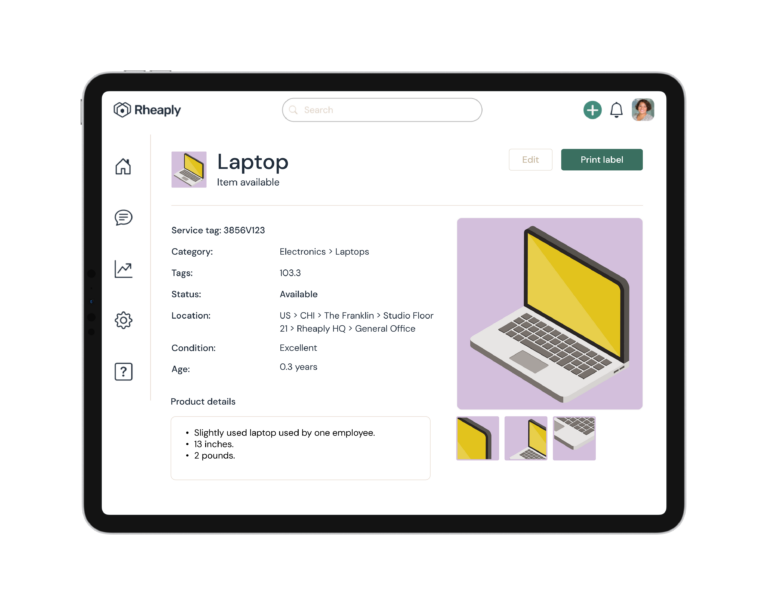Inventory Tracking Software
Rheaply puts reuse on the table for every organization.
Inventory Tracking Software
Inventory tracking software is a digital solution designed to help businesses monitor and manage their inventory levels and overall stock control. It enables companies to streamline their supply chain and ultimately improve their efficiency and profitability. Inventory tracking software can be helpful for organizations of all sizes and has become a crucial component of business operations.
This software provides a centralized platform where businesses can access real-time information about their stock levels, including raw materials, work-in-progress, and finished goods. It allows users to track the movement of inventory items throughout the supply chain, from procurement and storage to production and sales.
Whether you’re looking for inventory software for small business or large enterprises, it’s important to understand the benefits of these solutions in order to get an idea of how they may be able to improve your operations for the better. Common benefits include:
Whether you’re looking for inventory software for small business or large enterprises, it’s important to understand the benefits of these solutions in order to get an idea of how they may be able to improve your operations for the better. Common benefits include:
- Preventing Stockouts and Overstocking: By using inventory tracking software, businesses can monitor their stock levels in real time and make informed decisions about when to reorder stock or discontinue slow-moving items. This can help ensure that they have what they need when they need it.
- Improving Inventory Record Accuracy: Keeping accurate inventory records is key to avoiding discrepancies between stock levels. Differences between actual and recorded stock can result in a plethora of issues and impact a company’s budget in a major way.
- Enhancing Order Fulfillment and Customer Satisfaction: One of the advantages of having real-time inventory data easily and readily available is that it allows businesses to ensure prompt order fulfillment.
- Saving Time and Resources: It’s no secret that old-fashioned inventory management can be tedious and time-consuming. It can also result in a number of human errors, all of which can be avoided with specialized software. By preventing errors, businesses can also save money.
- Providing Valuable Insights: Inventory tracking software provides access to valuable data that can be used to drive smarter decision-making. Rather than relying on guesswork, users can dig deeper into their data and leverage advanced analytics to reduce inefficiencies and increase profits.
Inventory tracking software enables businesses to reach their goals quicker and more efficiently. They can automate routine, time-consuming processes and gain access to data with which to make critical decisions. There are multiple types of inventory software available on the market today, and so it’s important for companies to consider their specific needs when choosing a solution.
Rheaply allows users to gain deeper visibility into their operations, which can be extremely helpful for those looking to optimize their inventory levels. By promoting reuse and recycle principles, Rheaply’s inventory tracking software can allow users to keep a closer eye on their inventory and determine how to achieve greater sustainability in their supply chain activities.
Inventory Management Systems
An inventory management system helps organizations control and optimize their inventory levels throughout the supply chain. These systems enable users to maintain accurate records of their stock, automate manual tasks, and make data-driven decisions. This is vital to ongoing business success.
Systems like these work by centralizing important information related to inventory levels.
Inventory management software examples include a range of solutions designed to cater to businesses of different sizes and industries. These solutions offer a variety of features and functionalities, such as barcode scanning and RFID technology, which help to automate the data entry process and reduce errors. There are several ways that inventory management systems can be used to track inventory levels and improve operational efficiency, including:
- Real-Time Inventory Tracking: By providing real-time visibility into stock levels, inventory management systems enable businesses to monitor their inventory status and make informed decisions about resources.
- Automation of Manual Tasks: Inventory management systems automate time-consuming and error-prone manual tasks, such as data entry and calculations. This not only saves time and resources but also reduces the likelihood of errors and discrepancies in inventory records.
- Integration with Other Systems: Inventory management systems often integrate with other software solutions. This helps to facilitate the flow of data between different platforms.
- Reporting and Analytics: Inventory management software features reporting and analytics tools, which provide critical information that can be used to drive smarter decision-making. These insights can ultimately help organizations make better use of their resources and determine what, if anything, needs revamping to boost efficiency and profits.
- Sustainable Business Practices: Optimizing inventory levels and reducing waste is a great way for companies to adopt more sustainable practices. For example, using inventory tracking software, an organization could more accurately predict what they’re going to need down the road and cut back on excess materials.
Best Inventory Management Software
When choosing the best inventory management software, it’s important for businesses to ensure that the solution aligns with their specific needs and objectives. By managing inventory and assets effectively, organizations can contribute to a circular economy and adhere to sustainable business practices.
Here are some of the key factors to consider when choosing inventory software:
- Business Size and Industry: The best inventory management software for small businesses may differ from the best inventory management software for manufacturing or large enterprises. Be sure to assess your business size and industry to narrow your options to those that are most relevant to your unique needs.
- Features and Functionality: Consider the features and functionality offered by the software. Look for solutions that provide real-time inventory tracking, automation of manual tasks, and reporting and analytics tools.
- Ease of Use and Implementation: Your software of choice should be user-friendly and easy to implement within your existing business processes.
- Scalability: It’s a good idea to pick a solution that can grow alongside your business. As your company evolves, the inventory management software should be able to accommodate changes in product offerings, customer base, and operational complexity.
- Customer Support and Training: Additionally, the best inventory software offers excellent customer support and training resources to help users troubleshoot issues and get the most out of the system.
- Budget: Of course, it’s always important to keep budget in mind when evaluating different solutions. Consider ROI and long-term investment in the solution and what you ultimately hope to get out of it.
Taking the time to find the best inventory software that aligns with your business needs can help ensure the success of your inventory management program. Whether you’re looking for the best inventory management software for manufacturing, healthcare, or anything in between, it’s important to carefully weigh all of your options. This is the best way to find the solution that’s right for your organization and will yield the maximum ROI.
Inventory Management Software For Manufacturing
Inventory management apps are mobile applications created to help users easily and efficiently track inventory levels, no matter where they’re working from. For instance, someone that’s working away from the office can use an app to stay on the loop remotely, communicating with others on their team as needed. This can help promote alignment across the organization.
Apps and their respective features vary depending on the industry and use case. Those in the manufacturing space should look specifically for apps and software designed for manufacturing. The following are some of the benefits and features typically included with inventory management software for small manufacturing business:
- Improved Efficiency: Inventory management apps streamline the inventory management process by automating manual tasks. This means that, instead of having to hire additional help to carry out time-consuming manual processes, businesses can automate those tasks via specialized software.
- Heightened Customer Satisfaction: Fulfilling customer orders is paramount to inventory management best practices. Companies can ensure satisfaction by streamlining the fulfillment process with inventory tracking software.
- Sustainability: Inventory management software for manufacturing contributes to sustainable business practices by minimizing waste, reducing the environmental impact of excess production, and optimizing resource utilization.
As with any software solution, manufacturers should consider how to best integrate the old with the new. This is key to improving efficiency across the board.
Circular Economy Benefits For Business
Social sustainability in business accounts for social factors, such as employee well-being and ethical practices, to ensure long-term growth. The circular economy, by extension, is an economic model that promotes the efficient use of resources, minimizes waste, and encourages the recycling and repurposing of materials. Social sustainability and the circular economy are both key to promoting good business practices.
One of the key connections between social sustainability, the circular economy, and the management of inventory and assets is the emphasis on responsible resource utilization. By managing inventory and assets effectively, organizations can reduce their environmental impact, resulting in cost savings and a more sustainable supply chain.
Another link between social sustainability and inventory management is the focus on ethical sourcing and procurement practices. Businesses that carefully select suppliers that adhere to fair labor practices contribute to social sustainability. They also help to maintain a responsible inventory management system.
Moreover, adequate management of inventory and assets can directly impact the wellbeing of employees and the communities in which businesses operate. By maintaining safe and organized warehouse environments, organizations can reduce the risk of accidents and promote employee health and safety.
Circular economy benefits for business extend beyond environmental and social sustainability, however. Adopting circular principles can lead to increased innovation, differentiation, and a competitive advantage. For example, businesses can explore new product designs and processes that involve recycling or repurposing. This not only drives sustainability, but creates new business opportunities and revenue streams.
Rheaply plays a critical role in the circular economy, providing a platform wherein businesses can sustainably dispose of excess or outdated materials. Those materials can then be sourced by those that need them. By keeping items in circulation longer, companies can reduce their carbon footprint and do their part to create a greener future.



